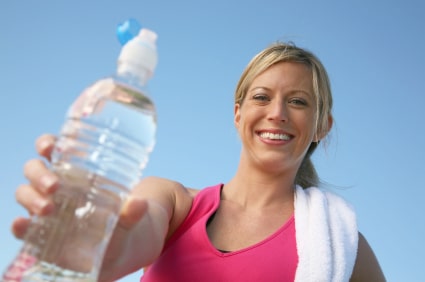 When you do a tough workout, especially in the hot summer sun, it’s important to stay hydrated. You lose water when you sweat, but also minerals and electrolytes like sodium, potassium, and chloride. These electrolytes play an important role in heart and nerve function, so they need to be replaced. Mild dehydration also decreases exercise performance by reducing blood volume and contributing to fatigue. No wonder so many athletes are turning to sports and electrolyte drinks to replace lost water and electrolytes. These drinks are growing in popularity among athletes and recreational exercisers alike. But do you really need one, or can you depend on good, old-fashioned water to keep you moving on all cylinders when you’re working out?
When you do a tough workout, especially in the hot summer sun, it’s important to stay hydrated. You lose water when you sweat, but also minerals and electrolytes like sodium, potassium, and chloride. These electrolytes play an important role in heart and nerve function, so they need to be replaced. Mild dehydration also decreases exercise performance by reducing blood volume and contributing to fatigue. No wonder so many athletes are turning to sports and electrolyte drinks to replace lost water and electrolytes. These drinks are growing in popularity among athletes and recreational exercisers alike. But do you really need one, or can you depend on good, old-fashioned water to keep you moving on all cylinders when you’re working out?
What is an Electrolyte Drink?
As the name implies, an electrolyte drink contains electrolytes such as sodium, potassium, and chloride that are lost through sweat during heavy exercise. Some of the more common electrolyte drinks available at grocery stores include Gatorade and Powerade. The problem with popular electrolyte drinks such as these is they’re usually loaded with sugar and often colored and flavored with artificial dyes and flavorings. These drinks are also expensive, and if you guzzle a few every time you work out, the costs can really add up. The advertisers cleverly play of the benefits of these drinks, and it’s easy to get sucked into buying them.
Isn’t Water Good Enough?
In cases where you’re exercising less than two hours at a moderate intensity in a cooler environment, water is a perfectly acceptable way to rehydrate. It’s unlikely you’re going to deplete stores of electrolytes under these circumstances since you lose more water than electrolytes when you sweat. Plus, the kidneys have their own way of conserving sodium when too much is lost through sweat.
On the other hand, if you’re planning on exercising for longer than two hours at a stretch in a warm environment or you’ll be doing a high-intensity workout in a hot environment, replacing lost electrolytes becomes more of an issue. In this case, drinking an electrolyte drink to replace sodium, potassium, and chloride that are lost through heavy sweating is beneficial.
Make Your Own Electrolyte Drink
Even in these cases, you don’t have to buy expensive electrolyte or sports drinks. Make your own by diluting fruit juice with water and add ½ teaspoon of salt to each cup. It’s all natural with no added dyes or artificial flavorings, and it’s cheap. You can find a lot of recipes on the internet on exactly how to make your own electrolyte drinks. If you have a history of high blood pressure, talk to your doctor before drinking beverages with added sodium.
Another electrolyte-rich drink that’s growing in popularity as a sports drink is coconut water, which shouldn’t be confused with coconut milk. It’s a good source of electrolytes that are lost through sweating, and it’s sugar-free. It’s even been used historically as an intravenous fluid to replace fluids and electrolytes in patients. It’s also low in fat and calories and is growing in popularity among people who work out. You can find it at many grocery stores these days.
Electrolyte Drink vs. Water?
If you’re working out at a moderate-intensity for less than 2 hours, and the temperature and humidity aren’t high, water is all you need. If you’ll be working out hard in the summer sun for longer periods of time, an electrolyte drink gives you an extra layer of safety if you’ll be sweating profusely during your workout.
Not everyone likes the taste of water, and if drinking an electrolyte drink encourages you to stay well-hydrated, it’s a good choice as long as you don’t choose one that’s too high in sugar. These drinks aren’t calorie-free, and if you sip enough of them, the calories add up. Try low-calorie coconut water instead of a commercial sports drink that’s high in sugar.
References:
Exercise Physiology. Energy, Nutrition, and Human Performance. Fifth edition. 2001.
Exercise Physiology. Theory and Application to Fitness and Performance. Seventh edition. 2009.
Related Articles By Cathe:
Are Colder or Room Temperature Beverages Better for Exercise Hydration?
Do You Really Need to Drink 8 Glasses of Water Daily?
Benefits of Drinking More Water and Tips for Making Sure You Do
Which Beverages Are Most Hydrating?
Hydration and Exercise Performance: What Happens When You Don’t Drink Enough Water?
Can Drinking More Water Help You Lose Weight?
If You Drink More Water, Will You Consume Fewer Calories?
5 Common Truths & Myths about Drinking Water and Staying Hydrated

